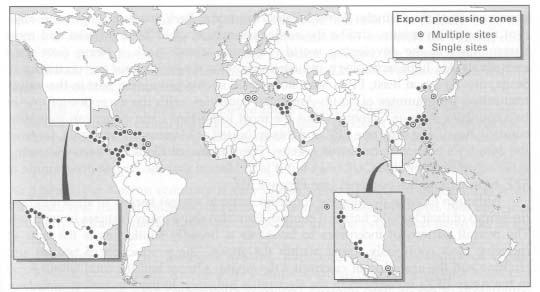
“Light” Industry
traditionally: textiles, garment, food
processing
now also: electronics
Nature of the work:
Low paying, repetitive, noisy, often with
very poor air quality.
Jobs segregated by gender even though
women could perform most of the higher paying jobs performed by men
Common injuries/diseases suffered by women
working in these industries: hearing loss/deafness, lung
ailments,
repetitive motion disorders (“carpal tunnel syndrome”)
“Making Women’s Labor Cheap”
Cynthia Enloe, 1989, “Blue Jeans
and Bankers,” Bananas, Bases and Beaches: Making Feminist Sense
of
International Politics. Berkeley: UC Press.
Enloe writes:
Definition of “skilled labor”: the
jobs that men do are described as skilled (e.g. in garment shops,
cutting
and pressing);
jobs that women do (sewing in garment shops, running spinning machines, weaving machines in textile plants) are labeled “unskilled”
Why???
The international
economy works the way it does…in part because
of the decisions which have cheapened the value of women’s work.
These decisions have
first feminized certain home and workplace tasks—turning
them into ‘women’s work’ – and then rationalized the devaluation of
that
work (Enloe, 160)
Without laws and cultural presumptions about sexuality, marriage
and feminine respectability these transformations wouldn’t have been
possible
(160).
EPZs

Why Women?
Political Clout/Organization:
Women who work in light industry are
less
politically important constituencies, less “militant” that
traditionally
male industries (mining, auto workers)
Traditionally, they have
been under-organized,
not unionized
Enloe:
the gendered nature of international
development, global economy: the well-dressed male investment
banker
vs. the over-worked, poorly dressed female garment worker
Negative Impacts of EPZs
Global sweatshop movement as a response
Arguments in
Favor of Free Trade Zones
bring jobs and capital investment that would otherwise not be
there
need to grow their way out of poverty
WEPZA
Quakers working
to improve working conditions in N Mexico
Fair Trade Movement
Global Exchange
Nike
Campaign
Nike
Code of Conduct